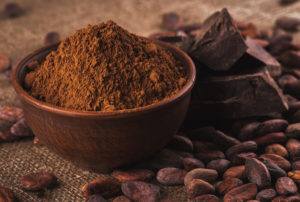Wouldn’t it be great if dark chocolate and nitric oxide could boost your athletic performance.
I’m not sure if I should have a question mark or an exclamation mark after that statement. What I do know is that I want to thank Anna for sending me the following article from the New York Times:
Chocolate Can Boost Your Workout. Really.
This article featured a new sports performance study that was published December 2015 in The Journal of the International Society of Sports Nutrition. Here’s a quick summary of this study:
There were eight male cyclists who agreed to replace one of their normal snacks with 40 grams of chocolate per day. 40 grams is 1.4 ounces or about one and a half squares. They used the Dove brand of dark chocolate. White chocolate was used as a control.
All cyclists were tested before starting their chocolate program. These tests measured their fitness and oxygen uptake during moderate rides and all-out sprints on a stationary bike. Then they were told to eat their chocolate every day for two weeks. After two weeks they returned to the lab for a repeat of these tests.
The results showed that the cyclists who consumed the dark chocolate performed better in most of their physical tests over those who ate the white chocolate. This improvement was attributed to improved nitric oxide levels. However, this was an assumption since the researchers did not directly measure nitric oxide levels.
Google Dark Chocolate and Nitric Oxide
So I decided to Google the word phrase dark chocolate and nitric oxide and I was surprised to find an actual study in PubMed titled:
Effect of dark chocolate on nitric oxide serum levels and blood pressure in prehypertension subjects.
In this study the researchers again used both dark chocolate and white chocolate. The results showed that for those participants who consumed the dark chocolate they had
an increase in nitric oxide serum levels
a decrease in their systolic blood pressure
and it all occurred after 15 days of treatment. Which is a pretty short period of time. And the amount of dark chocolate used in this study was 30 grams per day.
Which begs the question: What’s in dark chocolate that’s not in white chocolate?
Dark Chocolate, Nitric Oxide, and Epicatechin
It seems that dark chocolate is rich in epicatechin, which is a plant nutrient found in cocoa. Dark chocolate has a higher level of cocoa where as white chocolate contains little or none of this plant nutrient.
So I Googled epicatechin and nitric oxide (don’t you just love Google and internet searches) and found the following article on PubMed:
epicatechin activation of endothelial cell endothelial nitric oxide synthase, nitric oxide, and related signaling pathways
This study clearly shows that epicatechin stimulates the enzymes of the endothelium to produce higher levels of nitric oxide. They’re not sure how this occurs but it seems to improve the use of calcium.
This would make sense since the production of nitric oxide via the enzymes of the endothelium is a calcium dependent reaction.
Final Thoughts About Dark Chocolate and Nitric Oxide
I’m a firm believer in nitric oxide therapy for improving cardiovascular health. By itself nitric oxide is the master signaling molecule of your entire cardiovascular system. And your endothelium regulates most of your cardiovascular health.
Anything that can help boost nitric oxide levels typically results in improved blood flow, which can have positive benefits for everyone. Especially athletes and people with high blood pressure.
Dark chocolate can be a useful food source for improving your cardiovascular health and athletic performance via improved nitric oxide production. Just remember the following:
Use a dark chocolate with the highest cocoa content
Use only one square or a square and a half per day to limit caloric intake
Just realize that the bitter taste of the dark chocolate is good. And you only need a small amount to provide a benefit.
Leave a Reply
You must be logged in to post a comment.